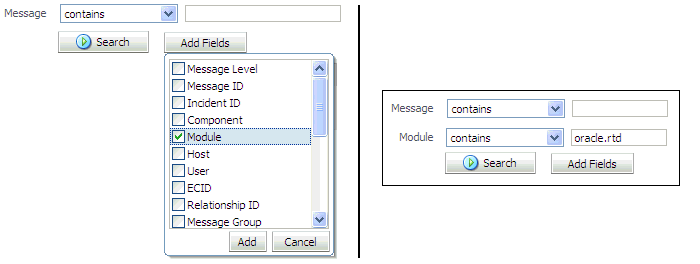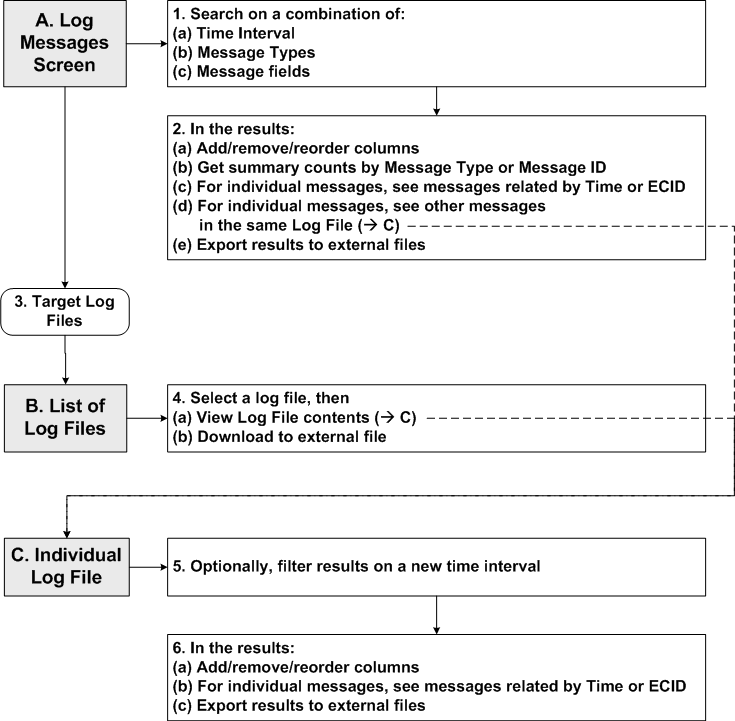A System Log and Configuration Files
This appendix provides the names and locations of the Oracle RTD log and configuration files. To ensure the integrity of the information in these files, you should use operating system or other tools to set the appropriate file permissions on the parent directories that contain these files, so that an intruder cannot access them.
This section contains the following topics:
A.1 Searching and Viewing Server-Side Log Files
In the Enterprise Manager of Fusion Middleware Control, you can search and view log files both within and across Oracle Fusion Middleware components. You can also download log files to your local client and view the log files using other tools.
You must first log into Fusion Middleware Control. For details, see Section 2.1.1, "Logging into Fusion Middleware Control."
To access the log files from the Oracle RTD home page, right-click the deployed Oracle RTD application in the navigation pane, and select Logs, then View Log Messages.
The Log Messages screen appears.

Figure A-1 shows an overview of the main Oracle Fusion Middleware operations to search and view log files.
For general information about searching and viewing log files, see the section "Searching and Viewing Log Files" in Oracle Fusion Middleware Administrator's Guide.
The following notes are more specific to Oracle RTD users:
-
The list of log files includes the Managed Server log file, which has the general name
server_name.log.The Oracle RTD runtime log files have the general name
server_name-diagnostic[-<n>].log. -
To search for files that are specific to Oracle RTD, first add the field Module to the search fields, enter oracle.rtd in the Module search box, then click Search.

A.2 Configuring Oracle RTD Server-Side Log Files
You can configure the following properties of Oracle RTD server-side log files:
-
The name and location of log files.
-
The size of log files.
You can specify that a new file is created either when the log file reaches a certain size or when a particular time is reached.
-
The level of information written to log files.
This enables you to control the type and level of detail of information written to log files, by specifying message type and message level. The most common message types are Error, Warning, Notification, and Trace. You can set the message level of Notification and Trace files to control the granularity of message detail.
-
The format of the log files.
-
The Locale encoding.
For more information about configuring log files, see the section "Configuring Settings for Log Files" in Oracle Fusion Middleware Administrator's Guide.
A.3 Log Files
Oracle RTD provides both server and client logs. In addition, there are log files specific to Eclipse and application servers.
This section contains the following topics:
A.3.1 Main Oracle RTD Log Files
Table A-1 shows the two main Oracle RTD log files. The Oracle RTD Server log is the main log to use for troubleshooting problems
Table A-1 Main Oracle RTD Logs
| Log Type | Default Location |
|---|---|
|
Oracle RTD Server log |
|
|
Oracle RTD Client log |
|
where:
-
RTD_HOMEis the directory into which you extract the client-side Oracle RTD files.
-
RTD_RUNTIME_HOMEis the directory into which you install runtime Oracle RTD, typically<mw_home>/user_projects/domains/domain_name/servers/server_name/.
A.3.2 Log Files for Oracle RTD Client Tools
In addition to the Oracle RTD Client log, Oracle RTD maintains the following client tool log files:
-
RTD_HOME/scripts/SDDBTool.log -
RTD_HOME/log/loadgen.csv
For Decision Studio log messages, see Section A.3.4, "Eclipse Log File."
A.3.3 Server-Side Log Files
This section lists the server-side log files under WebLogic.
RTD_RUNTIME_HOME/logs/server_name.log RTD_RUNTIME_HOME/logs/server_name-diagnostic[-<n>].log RTD_RUNTIME_HOME/logs/server_name.out
A.3.4 Eclipse Log File
The Eclipse log file, used for logging Decision Studio log messages, is Decision_Studio_Workspace/.metadata/.log.
Setting Logging Levels for Eclipse
To set the logging levels for Eclipse, edit the following file:
RTD_HOME\eclipse\plugins\com.sigmadynamics.studio_11.1.1\etc\eclipse-log.properties
To adjust logging levels, set the values to true or false. The default settings are as follows:
-
debug=false
-
info=true
-
warn=true
-
error=true
-
fatal=true
-
trace=false
